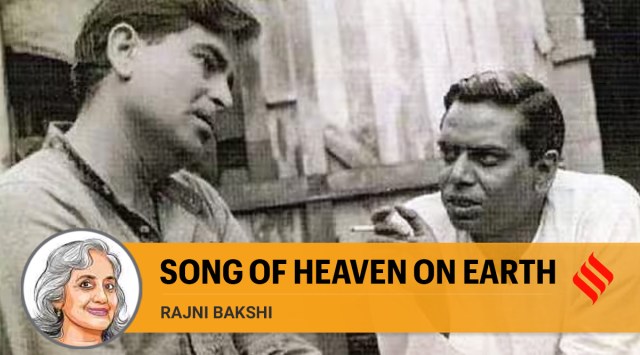Opinion by Rajni Bakshi
Opinion Rajni Bakshi on ‘Mera joota hai Japani’ lyricist Shailendra: The poet’s vision
In his lyrics, Shailendra showed how heaven on earth can be made possible
 It is only natural that the gathering of the Screenwriters’ Association on the birth centenary of the legendary lyricist, on August 30, is dedicated to ‘Tu zinda hai’. (Express File Photo)
It is only natural that the gathering of the Screenwriters’ Association on the birth centenary of the legendary lyricist, on August 30, is dedicated to ‘Tu zinda hai’. (Express File Photo) “Tu zinda hai, tu zindagi ki jeet mein yakeen kar”, approximately translates to “You are alive, believe in the victory of life”. This compelling anthem of determination and hope, by the lyricist Shailendra, has inspired several generations of post-Independence Indians.
It is only natural that the gathering of the Screenwriters’ Association on the birth centenary of the legendary lyricist, on August 30, is dedicated to ‘Tu zinda hai’.
But in this present moment, what are we to make of the next line of this much loved poem — “Agar kahin hai swarg, to utaar la zameen par”, that is, “If there be a heaven somewhere, bring it down to earth”?
Shailendra was among the finest voices amid the intense creativity that flowed through Hindi cinema immediately after Independence. His lyrical dreams of a heaven were not just about justice and equality as a political ideology. In essence, Shailendra celebrated those essentials that make for a life well-lived. So perhaps the best tribute to Shailendra in his centenary year is to reaffirm those essential values. Perhaps, this will serve as a reminder to always sift what is deeply important from differences and divides which can sometimes be on the surface.
After all, how can there be disagreement on “sajan re jhoot mat bolo, khuda ke paas jaana hai (don’t lie my friend, we all have to go to our creator)”? The flood of lies in public life and fake news can make you doubt if this is anything more than a poet’s illusion. But actually, the truth of this powerful ideal remains untarnished. Just as the North Star remains in place no matter how much one loses their way.
Who can be unmoved by Shailendra’s poignant question — “duniya banane wale… kahe ko duniya banaayi (oh! maker of the world, why did you make this world)?” And his loving complaint to the maker for being a silent witness to the “tamasha” of our travails?
Born in Rawalpindi in 1923, Shailendra was working for Indian Railways in Mumbai where Raj Kapoor heard him at a mushaira (poets’ gathering). When Kapoor offered to buy the poem Shailendra had recited, ‘Jalta hai Punjab’, the poet famously said that his poems were not for sale.
Legend has it that Kapoor assured Shailendra that a packet of money would be waiting for him, whenever he changed his mind. Eventually, Shailendra did go looking for Kapoor and went on to write some of the most famous songs of his films, including ‘Mera joota hai Japani’ and ‘Awara hoon’.
Films of the 1950s and up to late 1960s are studded with the lyrics of Shailendra — to name just a few, Dev Anand’s Guide and Kala Bazar, and Bimal Roy’s Madhumati, Bandini and Do Bigha Zameen.
Interestingly, ‘Tu zinda hai’ was never woven into a film. But over the years it became an anthem for activist groups of diverse ideological hues. Since Shailendra was associated with both the Progressive Writers’ Association and the Indian People’s Theatre Association (IPTA), he has been seen as a leftist poet.
Yet, much of his writing was beyond political and economic ideology. Even ‘Tu zinda hai’, which is a rallying song for justice and dignity, is in essence a call for the kind of tenacity that puts us above our sorrows. For that is what gives us the strength to continue working for a heaven-on-earth, regardless of how difficult the situation is. These days of sorrow will pass, wrote Shailendra, some day spring will come to the garden of our life.
The song that may well be most representative of Shailendra’s legacy drew on the truth that bhakti poets across India have reiterated over and over again. To truly live is to feel both the joy and the pain of the “other”. “Kisi ki muskurahaton pe ho nisaar, kisika dard mil sake to le udhaar (to be felled by the smile of someone, to take their pain as if on loan)” is a joyous need across the ages. This, insisted Shailendra, is what makes life fulfilling.
Over 60 years after this song was written, I have sung ‘Kisiki muskurahaton’ at gatherings of school children and been delighted to find that many of them know the song and sing along. That is a reaffirmation for both the author of ‘Tu zinda hai’ and of life itself.
From time to time, ideologically defined groups rise to power with a particular version of the ideal society that is ideal only by excluding some kinds of people. History has shown that such efforts usually create hell on earth.
Shailendra will be remembered through the ages because he tapped into the tried and tested truth that heaven on earth is possible only when we feel the joy and pain of others as our own.
The writer is the founder of the YouTube channel ‘Ahimsa Conversations’




